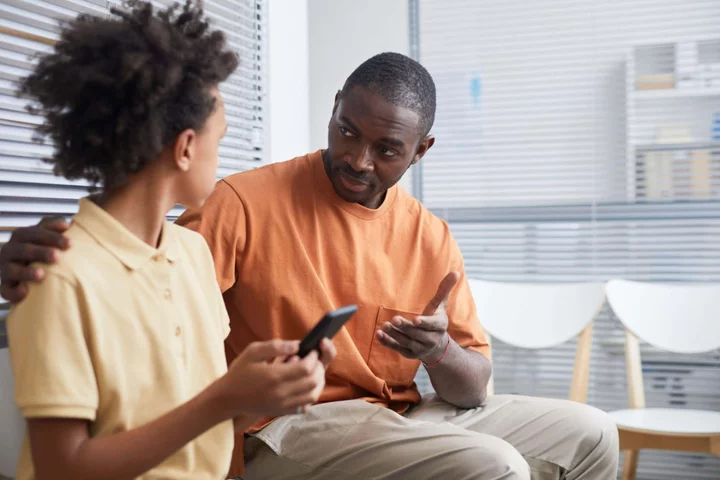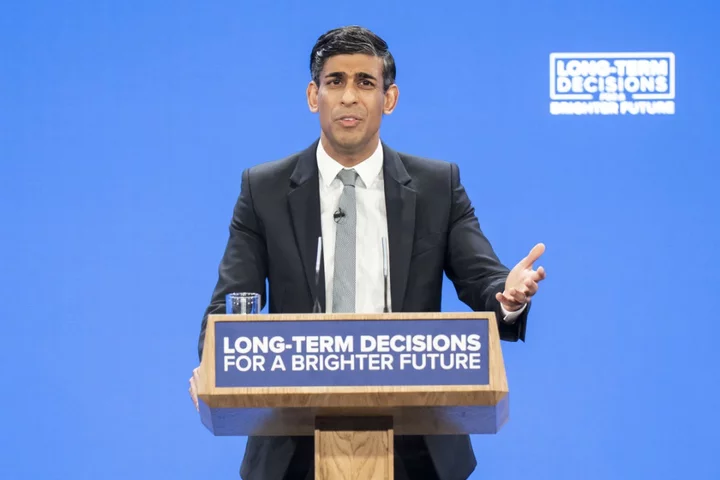
Fresh rocket attacks and ground battles as Israel and Hamas conflict intensifies
Fighting between Hamas and Israel raged into a third day Monday with militants launching a fresh barrage of rocket attacks and Israeli forces still battling to expel Hamas gunmen from its soil as jets continued to bombard the Palestinian enclave of Gaza.
2023-10-09 15:20

How to spot if your child is struggling with their mental health – and what to do next
Spotting when your child is struggling with their mental health, and knowing how to support them, can be tricky for parents and carers. It’s an important issue to be aware of, however. According to the Children’s Society, in the three years up to 2022, the likelihood of young people having a mental health problem increased by 50%, while children and young people’s mental health charity Place2Be says one in six children experience mental health difficulties, rising to one in four amongst 17–19-year-olds. Emotional disorders including depression and anxiety are among the most common problems to crop up. James Emmett, regional clinical lead at Place2Be, says although the Government has taken “great strides” to address the issue by introducing support teams and senior mental health leads in schools, “we’re still seeing a sharp increase in diagnosable mental health conditions among children and young people, now affecting one in six children – which is around five in every classroom”. Stevie Goulding, senior manager for parents and carers services at the charity YoungMinds, says: “More young people than ever are struggling with their mental health and are in need of support. This generation is facing a unique set of pressures – living through a pandemic, a cost-of-living crisis and ongoing global instability – and they’re worried about their future. “As young people navigate the ups and downs of growing up, recognising when to be concerned about your child’s mental health can be difficult.” Here, Goulding and Emmett outline how parents can spot whether their child may be struggling, and how to help… 1. Look for behaviour changes A change in behaviour is usually the first sign that a child or young person is feeling low, says Emmett: “They may eat too much or not enough, have problems sleeping, or stop doing things they normally enjoy.” Goulding adds: “If you notice changes in your child’s behaviour or if they appear persistently distressed, it could mean they’re struggling with their mental health, and it’s important to take their concerns seriously.” 2. Give them the opportunity to talk Goulding suggests parents try to talk to their child or teen about how they’re feeling in a non-judgemental way. “Remember, they might not want to open up at first, so reassure them you’re there for them when they’re ready to talk. Remind them it’s ok for them to feel scared or unsure, and try to reassure them,” she advises. 3. Don’t force them to talk However, Emmett says sometimes they may not want to talk, adding: “It’s important that adults don’t force them to have a conversation they don’t want to have. Parents and carers must make sure they’re available – but don’t pressure them to talk. “It can be really tempting to ask a lot of questions, but it’s easy to slip into interrogation mode. Try to focus on the here and now and what would help moving forward.” 4. Choose your momentAvoid discussing the underlying causes of your child’s distress with them during intense moments, Goulding advises: “While it’s crucial to provide support, it can be more beneficial to address these topics when they’re feeling calmer.” 5. Ask how they’re feeling Ask if your child notices when they feel more or less sad, for example, at school, or when they’re with their friends and family, suggests Emmett. “Responding sensitively to your child’s signals with concern and interest will help them learn you’re there for them,” he notes. Goulding says parents can acknowledge their child’s feelings by saying something like: ‘It’s completely understandable that you’re feeling…’. She explains: “This helps to reassure them their feelings are valid and it’s ok to feel different emotions.” 6. Remind them of obstacles they’ve overcome in the past When a child or young person gets overwhelmed, they forget just how much they’ve already dealt with in their lives. “Tell them stories about how proud you were when they coped with certain moments in their life, such as an sitting an exam, or moving house,” says Emmett. “This will remind them of their resilience – their ability to adapt to difficult situations.” 7. Encourage them to stay active Physical and mental wellbeing are often linked. “This means doing something active can be a great way to boost your child’s mental health, and heading outside into green space can have even greater benefits,” says Emmett. He suggests parents walk or cycle short distances with their child instead of going in a car: “It’s cheaper and will help the planet to be healthier too.” 8. Model positive relationships Happy relationships between parents and significant adults lead to better mental and physical health for everyone, stresses Emmett. “By modelling positive relationships of your own, you can help your child to see what positive, healthy and meaningful relationships should look like – and to recognise when friendships aren’t positive,” he says. 9. Remind them how they feel will change Your child might not be able to see the light at the end of the dark tunnel they’re in. “Reassure your child that how they’re feeling is temporary,” says Goulding. “Things can change and they can feel better.” 10. Discuss what help is available Talk to your child about the different sources of help that are available, such as helplines, text lines and online chat services. “Reassure them it’s alright to confide in others, as young people often worry about upsetting their parents,” says Goulding. As well as YoungMinds parents’ helpline (0808 802 5544) and Place2Be, other sources include your child’s school, which will have a designated senior mental health lead, your GP who can refer your child to CAMHS, Parenting Smart, which provides free advice for parents and carers of 4–11-year-olds on how to support their child’s wellbeing and behaviour, and the free Shout 24/7 textline for anyone in crisis (text SHOUT to 85258). Read More Does your pillowcase make a difference to your skin and hair health? Sarah Jessica Parker channels Carrie Bradshaw on the red carpet in mismatched shoes Does your pillowcase make a difference to your skin and hair health? As transphobic hate crimes rise by 11% in a year, how to be a better ally Impact of relationships with AI chatbot programmes ‘worrying’, psychologist says Pokemon’s Detective Pikachu Returns and more top games of the week
2023-10-09 14:53

$1.55 billion Powerball Jackpot is up for grabs in Monday night's drawing
The Powerball jackpot swelled to an estimated $1.55 billion for Monday night's drawing after weeks with no grand prize winner.
2023-10-09 13:47

Rwanda Supreme Court showdown: What do we know?
The UK Supreme Court case will consider the fate of the government's plan to send asylum seekers to Rwanda.
2023-10-09 13:23

Beijing Hyundai cuts asking price for Chongqing auto plant by 30%
SHANGHAI Beijing Hyundai Motor has cut the minimum asking price for its auto plant in the southwestern Chinese
2023-10-09 09:50

NFL Week 5: Who is Playing Sunday Night Football?
Last week's Sunday Night Football game was a star-studded affair as Taylor Swift, Hugh Jackman, Ryan Reynolds, Blake Lively and several other A-listers packed i
2023-10-08 18:27

The Exorcist: Believer director says 'shock value' isn't necessary for horror
'The Exorcist: Believer' director David Gordon Green has highlighted the ways in which horror has changed as a genre.
2023-10-08 15:19

Is South Korea failing women in the workplace? Just look at Hyundai Motor
When Hwang Ji-sun, 52, first joined the assembly line at South Korean carmaker Hyundai 22 years ago, women like her had it tough.
2023-10-07 07:50

Dolphins offense gets incredible comparison to late-90s juggernaut
The 2023 Miami Dolphins are out here traumatizing defenses.
2023-10-07 01:29

Brits reveal advice they would give their younger selves - including investing in property
Brits have revealed the advice they would give their younger selves – including investing in property as early as possible, taking more photos and not being afraid of rejection when asking someone out. A survey of 2,000 adults found 58 per cent would love nothing more than to give the younger version of themselves some good tips. Those surveyed said they would look after their physical health more, avoid wasting their time on negative people and learn from their mistakes. The top 20 list also included recommendations to save 10 per cent of your wages every month, spend more time with your parents and celebrate the little wins. But while 67 per cent would offer financial words of wisdom, 82 per cent felt positive knowing every decision they’ve made has led them to the point where they are now. And the same percentage (82 per cent) wanted to live their life with no regrets. AXA UK commissioned the study as part of its ‘Future You will thank you’ campaign which looks at how our future selves will thank us for the good choices we make today and reveals the decisions people are most thankful for. Scarlette Douglas, former A Place in The Sun host and I’m A Celebrity contestant, is taking part in the campaign discussing the forks in the road which led her to a career in television. She has contributed to an eBook revealing more of these insights from celebrities and the public. Scarlette said: “I had been performing in musicals for eight years when I made what I feel was a great decision at that point in my life, which was to move away from theatre and pursue a different career in television presenting. “I finished my last musical in 2014 and in 2015 I landed an amazing job as a presenter for A Place in The Sun – I had my first presenting role on a Channel 4 show. “I’ve now been in television for eight years and if I didn’t take a leap of faith and make that decision to leave musical theatre and pursue television, I would never be where I am now.” The study also found buying a house as soon as possible, getting married and heading off abroad were some of the things people are most grateful to their young self for. But when it came to regrets, 39 per cent had at least one big one in their life. Of those, 56 per cent said these were romantically linked, while 35 per cent had health-related regrets. Others spoke about how they wish they got to know parents and loved ones better before they passed away. Although 27 per cent had learnt from some of the regrets their parents had experienced. Architect and TV presenter George Clarke is also involved with the campaign and spoke about his first home. He said: “When I bought my first ‘grown-up’ house it was a wreck and definitely a building project. “We had to live in it while we did the work bit by bit over the course of three years – it was a major project and at the time we didn’t have a lot of money, so it was work, earn, do building work... repeat. “It was a major refurbishment and what made it even harder was our child was born during the build too. All of it was a big risk, especially a financial one. “The house looked amazing when we completed it, and although we loved it the financial pressure and the length of the build took its toll and we made the decision to sell. “We were very lucky with the sale and we were able to buy another house just a few hundred yards from the one we’d sold – that project began the journey of setting ourselves up for life.” The research also revealed that dropping a phone down the toilet, having to pay hefty vet bills and having their home flooded were the situations where people regretted not getting insurance. There was a desire among those surveyed, by OnePoll, to say yes more often, with people wanting to experience new travel and holiday destinations (46 per cent), new social activities and plans (35 per cent) and new friendships (34 per cent). Jason Fox, TV broadcaster, former UK Special Forces soldier and Royal Marines Commando, is also taking part in the initiative. He said: “When I left the marines after 20 years of service, I suffered from PTSD and had to learn to look after my mental health. “I realised I could also be useful in the civil world, by showing others that mental wellbeing is a strength, not a weakness. “When I was able to, the best decision I made was to invest in my mental health initiative and organisation ‘Rock 2 Recovery’ to support others in similar situations.” Tara Foley, AXA UK’s CEO, said: “Every decision we make impacts our future, from the biggest life choices to the smallest. “The findings show most people are pretty happy with the majority of decisions they’ve made, but they wouldn’t be averse to going back and giving their younger self a bit of guidance to influence how things turned out further down the line. “It’s encouraging that so many people say they aren’t living their life with regrets and it’s good to see a real desire to experience new things and push the boundaries, such as visiting far-flung places or trying new activities. “Making sure you’re always covered for every eventuality – whether it’s car, home, business or health insurance – means you can take on whatever life throws at you without worrying about unforeseen consequences or unexpected financial challenges.” Top 10 pieces of advice many people wish they could tell their younger self: 1) Be more confident 2) Try not to care what other people think 3) Don’t let opportunities pass you by 4) Look after your physical health more 5) Don’t waste time with negative people 6) Learn from your mistakes 7) Save 10 per cent of your wages every month 8) Eat healthily as it will pay dividends down the line 9) Go on all the holidays you can 10) Invest in property as early as you can 11) Don’t just settle for things 12) Just relax and enjoy the ride 13) Look after your mental health better 14) Spend more time with your parents 15) Celebrate the little wins 16) Take more risks 17) Don’t be afraid of rejection when asking someone out 18) Always be there for your mates 19) Take more photos 20) Be disciplined with your time Read More Brits are so fed up with emails that retail giants now send reminder letters Adults are eager to explore the world alone over the next three years, study finds Study finds more people are moving into high flood zones, increasing risk of water disasters Chris Hemsworth shares big life changes after ‘shocking’ health warning How to get rid of bedbugs: Signs and symptoms amid threat of UK invasion I have felt the shame of infertility – it’s why I started a club for women like me
2023-10-06 19:49

Hyundai, Kia to adopt Tesla EV-charging standard from 2024 in US
SEOUL (Reuters) -Hyundai Motor and Kia Corp said on Thursday that they had decided to adopt Tesla Inc's electric vehicle
2023-10-05 21:49

How to talk to kids about cigarettes and vapes, following Rishi Sunak’s smoke-free generation plans
Stopping the nation from smoking has long been a top priority for medical experts, families and governments, and PM Rishi Sunak has made his plans for the issues clear. At the 2023 Conservative Party Conference, Sunak said that the legal age for buying tobacco should rise every year from those born in 2009 in a bid to “try and stop teenagers taking up cigarettes in the first place”. He said: “A 14-year-old today will never legally be sold a cigarette” under new legislation he is proposing for England. The Prime Minister also said more must be done to “restrict the availability” of vapes to children, but what can be done by parents in the meantime? Here are the conversations to have with your children… The dangers of smoking “Starting smoking and vaping at a young age can have serious and long-lasting health consequences,” explains Dr Chun Tang, medical director and GP at Pall Mall Medical. “Nicotine is particularly harmful to developing brains. Young people are more vulnerable to nicotine addiction, which can lead to a lifetime of tobacco dependence. Nicotine impacts cognitive function and memory, potentially affecting academic performance. “Aside from the detrimental effect on cognitive ability as outlined above, smoking is, of course, a leading cause of various health problems, including lung cancer, heart disease, stroke, chronic obstructive pulmonary disease (COPD), and many others,” he says. “Smoking during adolescence can also interfere with the growth and development of the lungs, leading to reduced lung function. This can result in breathing difficulties and decreased physical performance.” The dangers of vaping Vaping isn’t a safe alternative, yet he sweet-smelling, plastic steam machines are rife. “Vaping is a relatively new phenomenon, and the long-term health effects are still not fully understood,” says Tang. “There is ongoing research to assess the potential long-term risks, including the development of chronic health conditions.” Vaping has been associated with various adverse health effects, including lung injuries, respiratory problems, and cardiovascular issues, he notes. “Some of the chemicals found in vaping aerosols can be harmful when inhaled into the lungs. “If a smoker takes approximately 15 puffs of a cigarette before putting it out, then we can safely assume that a 600-puff disposable vape is equivalent to around two packs of cigarettes. “Some reports suggest young people can get through as many as 7 vapes a week, the equivalent of 14 packets of cigarettes. “That is an enormous amount of nicotine and so we can expect to see the health risks posed by nicotine to be [more] exacerbated in vapers than smokers – which could be severely impacting cognitive function and affecting academic performance.” It’s essential, he says, for parents, educators, and healthcare professionals “to educate young people about the potential risks of vaping and smoking and provide support and resources for those who want to quit”. Don’t lecture them Try to be open and curious rather than defensive and angry if your child is smoking or vaping. Dr Kerry Irving, senior clinical psychologist at online mental health platform Kooth, says: “Approach any conversation to understand why the young person smokes or vapes rather than to lecture, as the latter can cause people to shut down.” Consider available supportThere may be resources online and in person that might help your child, from the NHS to TikTok creators tracking their quitting journey. “Suggest accessing external support – encourage the young person to see their GP or to make use of some of the free Stop Smoking initiatives online or in your local community,” Irving says. Be sympathetic to relapse Expect wobbles. If your teen or child is quitting smoking or vaping try to stop accept that overcoming an addiction is not easy and recovery is not linear. “Relapses are an important part of changing any behaviour long term,” says Irving. “You can help the young person learn from these by gently encouraging them to reflect on what went wrong and helping them plan for how to try again.” Read More Charity boss speaks out over ‘traumatic’ encounter with royal aide Ukraine war’s heaviest fight rages in east - follow live 4 must-have denim trends for autumn, from wide-leg jeans to split skirts Doorscaping: How to create a fabulous front door display for autumn More than a quarter of middle-aged women living with ‘metabolically healthy obesity’ – study
2023-10-05 19:46
